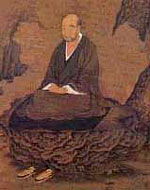Koso Wasan 48
Master T'an-luan explains
That failing to practice in accord with reality
Means first, that shinjin is not genuine in that person,
For it appears to exist at times, and not to exist in others.
Genuine Shinjin

This is the first in a series of five verses, which bring the section of Shinran Shonin's hymns about T'an-luan to a close. In them Shinran draws on a passage in T'an-luan's Commentary that has been an important guide to nembutsu practice ever since it was written. Shinran was able to bring to light an important shift of emphasis in the traditional understanding of this passage.
Needless to say, it is important to pause at this verse and consider the question, What does T'an-luan mean by 'genuine' shinjin?
Genuine shinjin is 'diamond-like'. It is not equivocal but settled, serene and true. It does not come and go. Even if one experiences a shock to one's shinjin, as when someone ridicules or insults the Dharma of Amida Buddha, Amida Buddha's Primal Vow - shinjin/faith - remains constant all by itself. This is because it is not a matter of conventional rationality, or self-willed conviction, but it is as steady and as true as the Primal Vow. When that is the case there is just no desire to shore-up shinjin or to secure it by way of one's own will-power or reason.
Of course, the idea of a genuine spiritual life does raise questions about plurality and tolerance. Genuine faith is not fanaticism but when it is coupled - as in the passage from T'an-luan's commentary that Shinran is celebrating in this verse - with the developing theme of 'the mind that is single', it clearly includes an unequivocal awareness that the nembutsu way absolutely excludes all other religious practices and ideas. That is because the mind that is single is Other Power.
In much of the Buddhist world the nembutsu is just an optional addition to other teaching and practice. Shinran, however, took the latent meaning of sincerity and singlemindedness to its logical conclusion and, in the Kyo Gyo Shin Sho, he goes to great lengths to encourage us to abandon all other religious ideas and practices. Indeed, it seems to me, that is how it would be if shinjin was genuine - that is to say, if it is the activity of the Primal Vow. Why on earth would anyone need a spiritual life other than the nembutsu?
Shinran is quite unequivocal and relentless in the matter of exclusive commitment to the nembutsu way. In later generations, his followers came to be known as adherents of the Ikkoshu - the Singleminded School. It is well-known, too, that some Shinshu followers were over-zealous and negative in their attitude to other religions, thus causing Rennyo Shonin to castigate such behaviour and to rule that genuine faith inspires religious tolerance because one's own relationship with the dharma is deep, stable and secure.
I rather like the tenor of Rennyo's teaching in this regard. He exhorts us in his letters - the Gobunsho - to nurture the shinjin of Amida Buddha deep in our hearts and at the centre of our lives, while remaining respectful to gods and other buddhas. This suggests a wonderful harmony between the vocation of genuine faith and singlemindedness, to which the nembutsu way calls us, alongside the reality of life in a pluralist society.
Japan of Rennyo's time was very like our own in that it was home to many spiritual paths, fashions and religions. The way to live is to be respectful and deferential to the religious sensibilities of others, while not compromising our own inclination to remain focussed exclusively on the nembutsu.
We ought also to be clear about the meaning of the phrase 'practice in accord with reality'.
In his commentary T'an-luan explains that 'practicing in accord with reality' is to know 'that the Tathagata is the body of true reality and, further, the body for the sake of beings'.1 In other words, to practice according to true reality is the know that Amida Buddha is the dharma body ('true reality') as compassionate means ('for the sake of beings'). These two facts underscore the true significance of the Name. It is not just any old name or phrase: it is the Name, the identity, the reality, of the Tathagata of unhindered light.
1: CWS, p. 82-3.